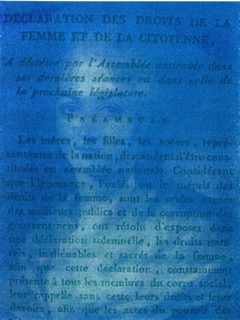 Women have a lot of times been the underdog in history. Women artists, for instance, are underrepresented in museums, and women philosophers have also only been researched since the 20th century. Hence, on International Women’s Day, it is good to reflect on an important, yet relatively unknown, female figure in history: Olympe de Gouges. Along with Mary Wollstonecraft, she was one of the leading feminists at the time of the French Revolution.
Women have a lot of times been the underdog in history. Women artists, for instance, are underrepresented in museums, and women philosophers have also only been researched since the 20th century. Hence, on International Women’s Day, it is good to reflect on an important, yet relatively unknown, female figure in history: Olympe de Gouges. Along with Mary Wollstonecraft, she was one of the leading feminists at the time of the French Revolution.
The daughter of a butcher and a servant, Marie Gouze married the much older Louis-Yves Aubry against her will at the age of 16. When he died soon after the birth of their first child, she refused to bear her husband’s name. She resolved never to marry again. She changed her name to Olympe de Gouges and left for Paris. There she told everyone that her father was the writer Jean-Jacques Lefranc, marquis de Pompignan. In the village she came from, this story had been going around for quite some time. As the daughter of a respected lawyer, her mother had had a lot of contact with Jean-Jacques Lefranc and was even going to marry him, were it not for the fact that Jean-Jacque Lefrancs’ family did not consider her a suitable candidate because she was not of nobility. Lefranc then left the village but returned just before De Gouges was born. Be that as it may, in Paris she could make good use of these rumours as an entry point to Paris’ elite.
Despite never receiving a proper education during her childhood, De Gouges aspired to a career as a writer. She eventually wrote several plays, including in 1785 the play: ‘l’Esclavage des Noirs’. This play was specifically about the abolition of slavery in the French colonies. This opinion did not make her popular with many people, especially the slavery lobby. In the end, this lobby paid people to sabotage the performance, so the play was only performed three times. Moreover, people felt there was no place for women writers. Nevertheless, she continued to write. Besides plays, she also wrote political pamphlets. This writing career was partly financed by Jacques Bietrix de Rozieres. The two were in frequent contact until her death. Yet they never married, as De Gouges later wrote in her most famous work ‘Declaration des Droits de la Femme et de la Citoyenne’: ‘marriage is the tomb of trust and love’.
Her ‘Declaration des droits de la Femme et de la Citoyenne’ is extremely interesting from a feminist point of view. This is because she based this piece on the ‘Declaration des droits de homme et du citoyen’; she replaced every word ‘man’ with the word ‘woman’ and added some provisions on gender equality. In this way, she wanted to make visible that rights for all citizens in practice often meant rights for male citizens only.
The ‘Declaration des droits de homme et du citoyen’ is a legal text. This is not copyrighted, but what if, as an experiment, we now assume that the text is copyrighted. In this case, would Olympe de Gouges have infringed the copyright of the authors of the original text, or would her work qualify as parody. After all, she only changed a few words and added a few sentences. The Copyright Act states that a publication of a work in the context of a parody, caricature or pastiche is allowed, provided it is reasonably permissible under the rules of society. In a parody, (part of) a particular work is imitated, with a few differences making humor or mockery. The European Court of Justice ruled that the parody exception must strike a balance between the copyright of the rightholder on the one hand and freedom of expression on the other.
In our opinion, this work by De Gouges could – in this experiment – therefore be qualified as parody, mocking all the men who say that the rights of citizens are so good, while ignoring that these rights do not apply to women. She holds up a mirror to society. A mirror that today would certainly fall under freedom of expression and would also count as an important sound in society.
Her innovative ideas on women’s rights and the abolition of slavery did not help her popularity. Added to this were her ideas on the new, yet-to-be-founded, republic. Although she was in favour of a republic, she was against the execution of the king. For she felt that Louis XVI had failed as king, but that as a man he could not be punished for the mistakes he had made as king. Moreover, the execution, in her view, would actually damage the republic. This view eventually was an extra argument leading to her own execution.
The foundation that Olympe de Gouges laid with her revolutionary ideas on women’s emancipation is at the heart of all emancipation movements that have taken place throughout history. Think of the suffragettes, the Dolle Minas and the more recent #Metoo movement, and of the situation in Iran. What would she think of it, if she would know now, that her tenacity still inspires people to stand up for their rights in 2023?
Team Heffels Spiegeler Advocaten
